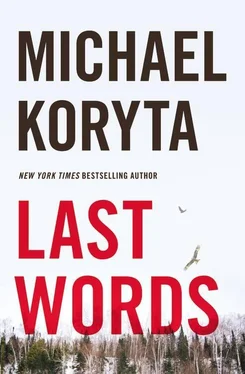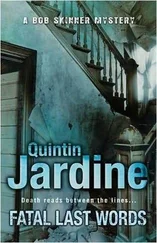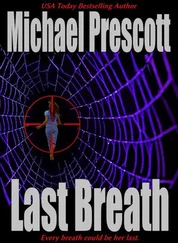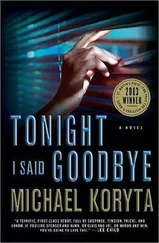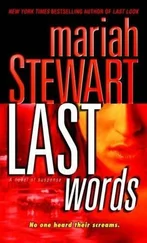“Go back home, and get some rest,” he’d instructed. “Your body took a beating. Don’t underestimate that. Some rest in the warm sun will be just right.”
It sounded just right, but it wasn’t an option. Mark had four days before his professional fate was decided for him, which meant three days to get some evidence for his side of the argument.
All of that evidence was in Garrison.
He arranged for a rental car to be dropped off at the hotel. This one was a Ford Edge. Charming names Ford was coming up with these days — Escape and Edge. They might be great marketing hooks, but Mark wouldn’t have minded seeing a Chevy at this point. He eased behind the wheel like an elderly man; each movement required planning and brought pain. He thought he’d known soreness before in life, but it had just been redefined. As he drove out of the parking lot, he felt alone in a way that surprised and chilled him. More alone than even the worst days after Lauren’s killing. Then, he’d had the support of those around him because they believed him. It had seemed a small thing then, to be believed.
Such a small thing.
You’re going to need a witness, Jeff, his closest friend, had said, unwilling to look him in the eye.
To fill the silence of the car on the highway, he streamed music through the car’s Bluetooth system. It was music he’d never allowed anyone except Lauren to hear him listening to. The songs had traveled with him from Montana, over time changing from one format to another and then another, the sound fuzzed with white noise by now. The original had been a cassette recorded by his mother at a powwow they’d attended one summer. It was drum and chant music, and the performances had been the one element of the weekend powerful enough to distract Mark from his shame even though his mother was recording it for use in her con. When Mark stole the tape, he’d been trying only to remove a bullet from her arsenal. He’d fallen in love with the sound, though. The power of the drums, the haunting cries in a tongue he could not understand but somehow felt he knew. The music was everything his mother was not: Authentic. And brave.
His uncle Ronny had caught him playing the tape once and viewed him grimly. Mark thought he might catch hell for stealing it, because his mother had searched frantically for weeks after discovering it was gone. Instead, Ronny had said only Don’t mess with that shit, Mark. You don’t know what it is.
Maybe he didn’t. He knew what he felt when he listened to it, though. Stilled and angry, calm and fearless, all at once. There was a hypnotic blend of fatalism and perseverance to the music, a sense of an understood mission.
He listened while he drove south, listened until the drums began to enter his blood like a pulse. By the time he reached Garrison, the pain and fatigue had retreated from the front of his mind, and his hands were steady on the wheel.
The downtown square snuck up on him in the way it can only in a small town — you ran right into the heart of the place without encountering any arteries along the way. The stretch of town that had been built up, where the hotels and chain restaurants were, was farther south, edging toward the interstate that was still miles away, trying to snuggle up as close as possible to something that connected the town to the rest of the world but not quite making it. Mark parked on the square, where he had his pick of empty spaces, their meters standing like hopeful ushers at a play that had overextended its run, the staff now outnumbering the audience. With piles of shoveled snow climbing the meter poles and not enough foot traffic on the sidewalk to even create slush, the only word for the town was forlorn .
As soon as he stepped out of the car, the wind caught him, and while he’d shrugged it off on his first visit, he couldn’t afford to now, not in his present condition.
Coffee seemed like the best substitute for sleep, and there was an old-fashioned diner on the square with a few booths on one wall and a long lunch counter. When Mark pulled open the door, a bell jingled, and ten faces pivoted in unison to look at him. Seven customers — all older men — and three employees. Mark walked up to the counter and asked for the largest coffee to go that they had. The old men were watching him with undisguised interest the way you could only when you belonged and the object of your stare did not.
“Where’s the best place to pick up a warm jacket around here?” he asked the girl behind the counter.
“Easton’s Mercantile,” she said. “Three blocks south, can’t miss it. Big old stone building. Used to be the biggest store in town. Now they sell hunting gear and work boots, things like that. They’ll fix you up.”
One of the men, a guy with a gray goatee, slipped a five-dollar bill out of his shirt pocket and slid it across the counter.
“Take his coffee out of this, Donna.”
“You don’t need to do that,” Mark said.
“I’ll even buy you a cheeseburger,” the man answered, “if you don’t mind telling us why in the hell you felt the need to tell that tale about Diane Martin.”
The remark seemed to add silence to the diner, but the truth was nobody had been talking anyhow. They were all just watching Mark.
“My picture made the paper, I take it,” he said.
“Oh, sure did. Takes an unusual man to tell a story like that.”
“Wasn’t a story, old-timer. People in this town have lied to me and then about me. I’m back to set the record straight.”
Mark met all their eyes, moving through the diner one unfriendly face at a time. “You all seem like the types who do a solid job of spreading the word in this town. Why don’t you spread this one, far and wide: whoever put me in that cave made one hell of a mistake in letting me come back to the surface.”
Easton’s Mercantile — or Merchantile, according to the ancient spelling that was carved into the limestone building — had morphed into a work-wear and sporting-goods store, with racks of shotguns and shelves filled with shells. Mark’s eyes lingered on the oiled black-pump shotguns, remembering the three that had been leveled at him in the snow.
At the moment, Mark was wearing a pair of running shoes that he’d left in the hotel room before it all began, and he picked up a pair of waterproof steel-toe Wolverine boots to replace them. The weight of them felt good, and uncomfortably familiar. It had been many years since he’d worn real boots, but for many years before that, that had been all he’d worn. From the clearance clothing rack, he chose a pair of wool base layers and a couple of heavy canvas shirts. Then he moved to the jackets. The gray, hooded Carhartt was there, a twin of Ridley’s and a cousin of the one Mark’s mother had given him that Christmas. Rugged and durable, kiddo. Just like you. He grabbed it.
On his way to the cash register, he walked past a cubby filled with knit caps and ski masks. He pulled one of the masks out and looked at it, remembering the three of them advancing toward him through the snow. Then he added it to the pile.
Mark traded the running shoes for the boots before he even left the store, then slipped the jacket on and stepped outside, feeling warm for the first time in days and also feeling as if he blended in better, which wasn’t a positive, because he did not want to be a part of this place. No choice about that, though. Not until he had some answers. He glanced back into the window of Easton’s Mercantile and saw that rack of Mossberg pump guns, sleek and black and all too familiar.
No, he was not quite done in Garrison.
There’d been a poker game in a Montana town called Silver Gate on a blizzard-blasted week when Mark was fourteen. His uncles had brought him along with them to a bar and old boardinghouse called the Range Rider where they entertained the crowd by walking in their cowboy boots across the massive log beams that spanned the ceiling, usually for dollar bets, sometimes just for the hell of it. A slip from those timbers would have meant a broken back, but they’d never fallen.
Читать дальше
